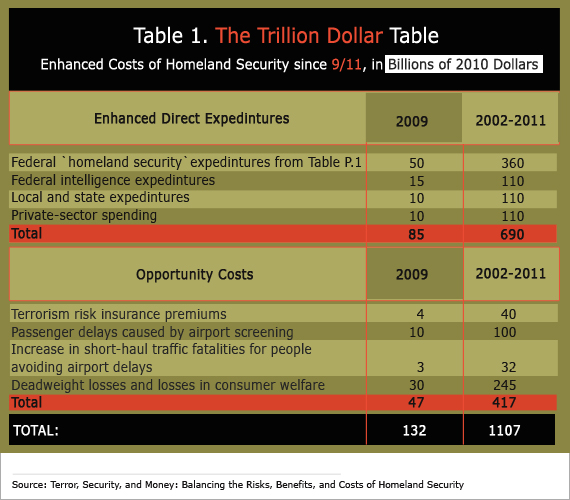The killing of Osama Bin Laden -- a milestone in the war on terror-- is being celebrated by America and its allies throughout the world. Even though bin Laden may have been functioning only as the titular head of Al Qaeda, he was the poster boy for terrorism and anti-Americanism throughout the world.
Bin Laden’s legacy is one of death and disruption. The 9/11 attacks and murders indirectly prompted America’s action in two wars in the Middle East (not including Libya), and ultimately caused the U.S. to divert trillions of dollars from traditional domestic and global operations to prevent more terrorist attacks.
There’s no doubt Bin Laden and the people who supported him cost us big time--emotionally, physically, and economically. Though we'll never be able to tally the total financial and economic cost of his nefarious deeds, the impact did exacerbate U.S. government debt and ultimately increased our deficit by adding new spending to the mix.
- Over 3,000 people were killed on 9/11, followed by over 5,000 military deaths and 30,000 life-changing injuries. The emotional result on the national psyche has been almost as dramatic. It began with tears and mourning followed by confidence in our ability to defeat bin Laden and “bring him to justice;” then we started questioning our role in Iraq after it was learned that there were no WMDs; shame followed, as images of abused prisoners in Abu Ghraib made their way into America’s living rooms. As time went on, there was a loss of faith in George W. Bush’s leadership-- and a loss of spirit throughout the country. The sense that we were united in our grief and hunger for justice began to slip away.
- The physical effects are ongoing: the hole at Ground Zero has yet to be filled; thousands of maimed and brain-damaged soldiers have come home from war, and a number of first responders suffer from serious disease as a result of their heroic efforts during the disaster. There’s also a change in the way we go about our lives: at airports—scans, pat downs, going shoeless, and stripping down to one layer of clothes. At public buildings, concrete barriers. Wary eyes cast at fellow Americans who may fit some perceived profile. And there are the cameras, everywhere taking pictures from office buildings in New York, Chicago, and London to name just three.
- Finally, there’s the cost:
o Add to this the rising costs at the Department of Homeland Security, an agency which has the dubious distinction of being on the GAO’s watch list because of inaccurate accounting. By 2008, America's spending on counterterrorism outpaced all anti-crime spending by some $15 billion.
o Between FY2009 and FY2010, average monthly DOD spending for Afghanistan grew from $4.4 billion to $6.7 billion a month.
o Average troop strength almost doubled from 44,000 to 100,000 as part of the troop surge announced by the President last year.
o Thirty-three new building complexes have been built for intelligence bureaucracies alone, occupying 17 million square feet—the equivalent of 22 U.S. Capitols or three Pentagons.
o The Department of Homeland Security now has a workforce of 230,000 people.
o This new system produces 50,000 reports a year—136 a day—which of course means few ever get read.
o State and local government investment has also drained budgets in spite of allocations from Homeland Security.
o According to the Congressional Research Service, since 9/11 Congress has approved expenditures totaling $1.283 trillion for the wars in Iraq and Afghanistan, reconstruction, foreign aid, embassy costs, and veterans’ health care and for other counter- terrorism operations such as providing enhanced security at military bases.

The costs to private business and the economy have also been huge, although in the long run, a number of new jobs and business emerged from the rubble. Here are some of the more important costs:
- Cost of replacing WTC buildings estimated at $3 billion - $4.5 billion. Damage to Pentagon, up to $1 billion.
- Loss of aircraft: $385 million.
- Cleanup costs: $1.3 billion.
- Infrastructure damage: $10 billion - $13 billion.
- Job losses: $17 billion in lost wages.
- Lost taxes and damage: $95 billion.
- Insurance losses: $40 billion.
- Air traffic revenue losses: $10 billion
- Victims compensation fund: $4.2 billion Lawsuits (some are under gag order and are incalculable).
- Global market fallout has not been calculated.
We may never know the true financial cost of what bin Laden set in motion--the impact on the debt and deficit, on oil prices from the Middle East, on international and domestic affairs. But a rough estimate of more than $3 trillion all in is probably a safe bet. We have also learned that it doesn't take a bin Laden to bring down our economy--we're perfectly capable of doing that ourselves, as the Great Recession has proved. But on May 1, 2011, a day on which 66 years ago the death of Adolf Hitler was confirmed, Americans have seen U.S. determination and competence in action—once more underlining our ability to get the job done. If this renewed American spirit can translate to Congress, we will have a shot at carefully and compassionately dealing with the deficit and really securing our future.
Related Links:
Osama bin Laden Dead; Obama Nails Him, Leads American Comeback (The Times of India)
Death of Bin Laden Brings Healing to Old Wounds (CNN)
Bin Laden's Death Could Cripple Terrorist Financing (Marketplace)





